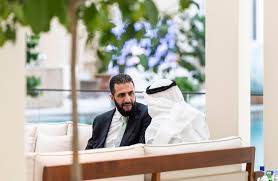Syria’s Ministry of Information has firmly denied reports circulating in several media outlets claiming that Syrian President Ahmad al-Sharaa met with Israeli officials, calling the allegations “fabricated and completely detached from reality.”
A government source speaking to local media stated unequivocally that “no meeting—direct or indirect—has taken place between President Sharaa and any Israeli official.” The source dismissed as baseless claims of a supposed encounter between Sharaa and Israeli National Security Advisor Tzachi Hanegbi in Abu Dhabi.
In parallel, Israel’s Israel Hayom newspaper also debunked the story, noting that Hanegbi was in Washington as part of Prime Minister Benjamin Netanyahu’s official delegation on the same day the alleged meeting was said to have taken place—making any involvement in meetings abroad impossible.
President Sharaa had arrived in the United Arab Emirates on Monday to begin a Gulf tour starting in Abu Dhabi, where he held official talks with UAE President Mohammed bin Zayed Al Nahyan. According to the Syrian state news agency SANA, the two leaders discussed economic and developmental cooperation, as well as support for Syria’s stabilization during its political transition.
Anwar Gargash, advisor to the UAE president, stated that the discussions focused on building a developmental partnership and stressed that “economic recovery is the key to Syria’s reintegration into its natural regional environment.”
Talk of Backchannel Negotiations Persists
Despite official denials, Israeli and international media outlets continue to speculate about the existence of a quiet negotiation track between Syria and Israel. In recent weeks, several reports have hinted at political and security talks, including remarks by Hanegbi himself in which he confirmed overseeing a “direct dialogue channel” with the Syrian government—without providing further details.
According to i24NEWS, secret negotiations are underway over a potential peace agreement to be reached by the end of 2025. The deal reportedly includes a phased Israeli withdrawal from areas in the Golan Heights, particularly those seized during Israel’s military push into the buffer zone following the collapse of the Assad regime in late 2024—including the strategic Mount Hermon summit.
However, Yedioth Ahronoth reported that the main obstacle to any agreement remains Syria’s insistence on a complete Israeli withdrawal from the occupied Golan—something Israeli security officials consider unfeasible in the near term. Talks are reportedly focused instead on a provisional security arrangement, facilitated by international mediators, rather than a full peace treaty.
Asharq Al-Awsat cited sources close to the Syrian government, stating that Damascus demands an end to all Israeli strikes inside Syrian territory and a return to the 1974 Disengagement Agreement.
Tel Aviv, for its part, is reportedly seeking a demilitarized buffer zone along the border. Syrian sources told the paper that as a “nascent transitional state,” Syria is not yet in a position to sign a final peace deal. A more realistic outcome, they said, may be a modified security accord that lays the groundwork for future peace—especially amid lingering public opposition and resistance from armed factions rejecting any rapprochement with Israel.
A Delicate Phase in Syria’s Transformation
This diplomatic controversy unfolds as Syria undergoes a deep political transformation following the end of the Assad era and the formation of a transitional government focused on rebuilding institutions and opening new diplomatic channels. Yet, the question of relations with Israel remains one of the most delicate and contentious issues—shaped by decades of military confrontation, territorial occupation, and widespread public rejection of normalization without a full Israeli withdrawal and sovereign guarantees.
This article was translated and edited by The Syrian Observer. The Syrian Observer has not verified the content of this story. Responsibility for the information and views set out in this article lies entirely with the author.


